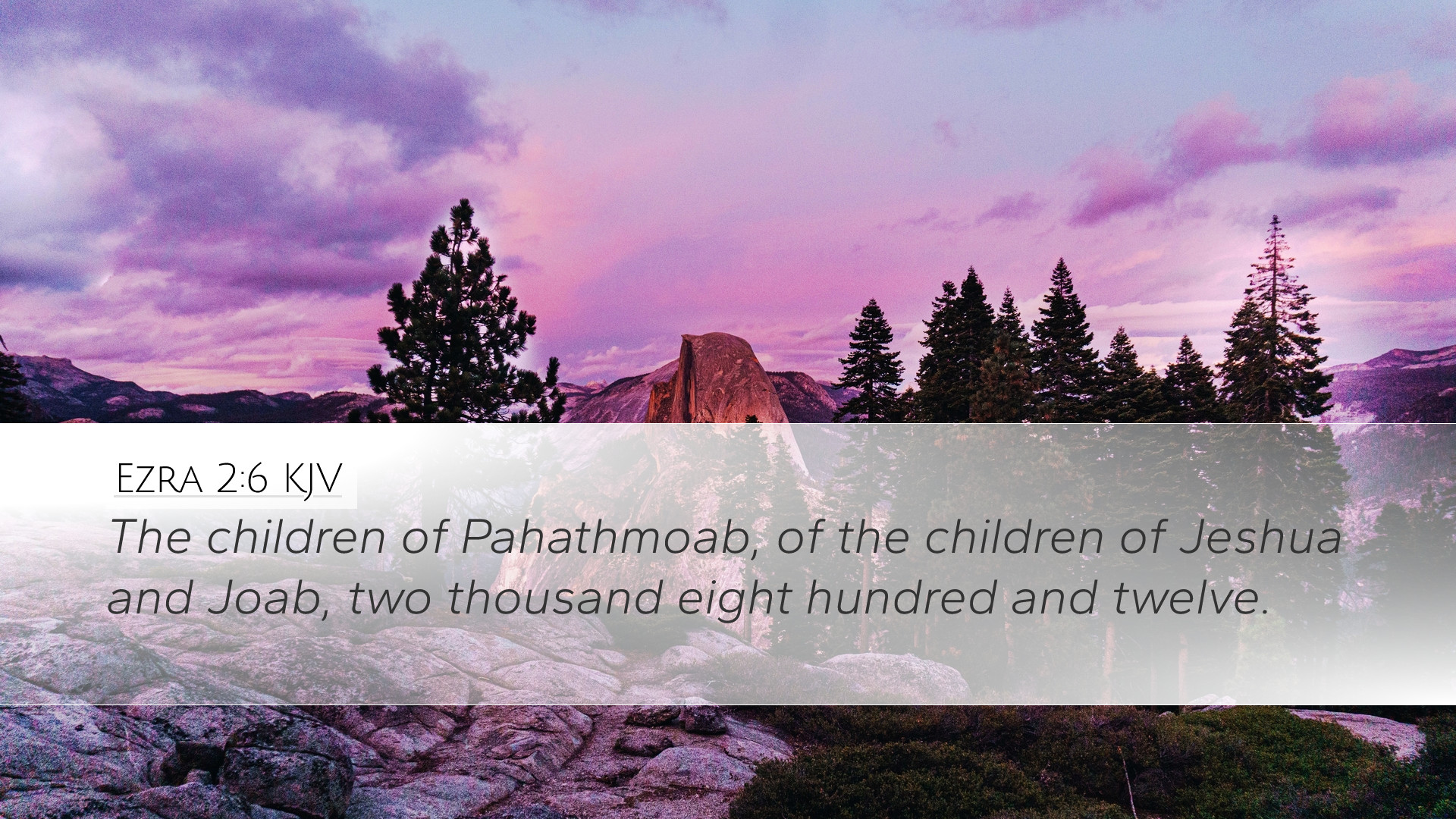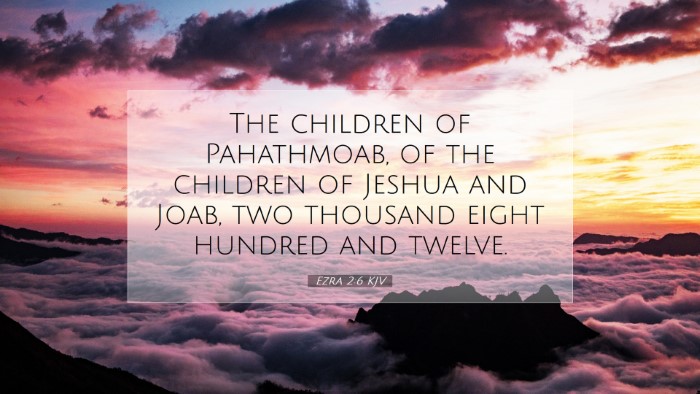Commentary on Ezra 2:6
Ezra 2:6 states, "The children of Pahath-moab, of the children of Jeshua and Joab, two thousand eight hundred and twelve." This passage is part of the genealogical record of those who returned from the Babylonian exile to Jerusalem. Understanding it requires a careful examination of the context and implications of these names and numbers as recorded in Scripture.
Historical Background
The context in which this verse is placed is crucial, as it follows the decree of Cyrus, king of Persia, allowing the exiled Jewish people to return to their homeland. The return was a significant moment in Jewish history, marking the restoration of the community and the beginning of the rebuilding of the Temple.
The Importance of Genealogy
The listing of names and numbers serves several purposes:
- Preservation of Identity: Genealogies in Scripture frequently underscore the importance of lineage. For the Israelites, this was not merely a matter of family pride but a reflection of their covenant relationship with God.
- Restoration of Worship: The return from exile was not just a physical journey but also a spiritual reawakening. By tracing their ancestry, returning exiles were reminding themselves of their responsibilities to God and the continuity of their worship practices.
- Fulfillment of Prophecy: The return of the exiles fulfilled prophetic statements made by figures like Isaiah and Jeremiah about the future restoration of Israel.
Analysis of the Text
In analyzing Ezra 2:6, we focus on the people mentioned and their significance:
Children of Pahath-moab
This group is particularly interesting due to its name, which means "the governor of Moab." The association with Moab indicates a complex history, as Moab was historically an adversarial nation to Israel. Yet, their return signifies reconciliation and the grace of God in drawing back even those with a tumultuous history.
Names Within the Family
Specifically mentioned are Jeshua and Joab. Jeshua is also known as Joshua, the high priest who played a significant role in leading the people spiritually. His inclusion emphasizes the importance of spiritual leadership in the restoration of Israel.
Joab’s mention perhaps signifies a military connection, suggesting the need for protection as they return to a land that had been besieged and was in ruins.
Numerical Significance
The number cited here, two thousand eight hundred and twelve, holds significance in biblical numerology. Key considerations include:
- Divine Order: Numbers in scripture often convey a sense of completeness and divine order. The specific counts of returning exiles asserted that God had a plan for re-establishing His people.
- Community Dynamics: The figure denotes not just individuals, but a community. The emphasis on communal identity at this moment was essential for reintegration.
Theological Reflections
From a theological perspective, Ezra 2:6 invites several reflections that may challenge contemporary readers:
- God’s Sovereignty: The return of the exiles demonstrates God's faithfulness. Even amid calamity and judgment, God retained His covenant promises to restore His people.
- Redemption and Grace: The willingness of the descendants of Moab to return illustrates God’s redemptive plans that often transcend human divisions and hostilities.
- The Role of Community in Worship: The emphasis on genealogies is a call to remember the importance of community. Together, under God, they were to restore worship central to their identity as His chosen people.
Practical Applications
For modern readers, particularly pastors, theologians, and laypersons, there are valuable practical applications:
- Understanding Our Spiritual Heritage: Just as the Israelites traced their lineage back to affirm their identity, we too must recognize and understand our heritage in the faith.
- Community Restoration: The collective return emphasizes the role of church communities today in supporting one another in spiritual growth and belonging.
- Grace for All: The narrative illustrates that God’s grace extends beyond historical enmities to include all who turn back to Him.
Conclusion
Ezra 2:6 may appear to be a mere record of names and numbers, but within it lies a rich tapestry of history, identity, and theology. Through careful study, we uncover insights that resonate with our spiritual journey today. As we reflect on these ancient names, we are reminded of our ongoing call to live as a restored community, drawing others into the redemptive story that God unfolds throughout history.


